Friends of AHBIC
If you aren’t already a Friend of AHBIC, we welcome you to join our group of organisations and individuals who are supporting Australia’s national beekeeping industry that supports you.


If you aren’t already a Friend of AHBIC, we welcome you to join our group of organisations and individuals who are supporting Australia’s national beekeeping industry that supports you.
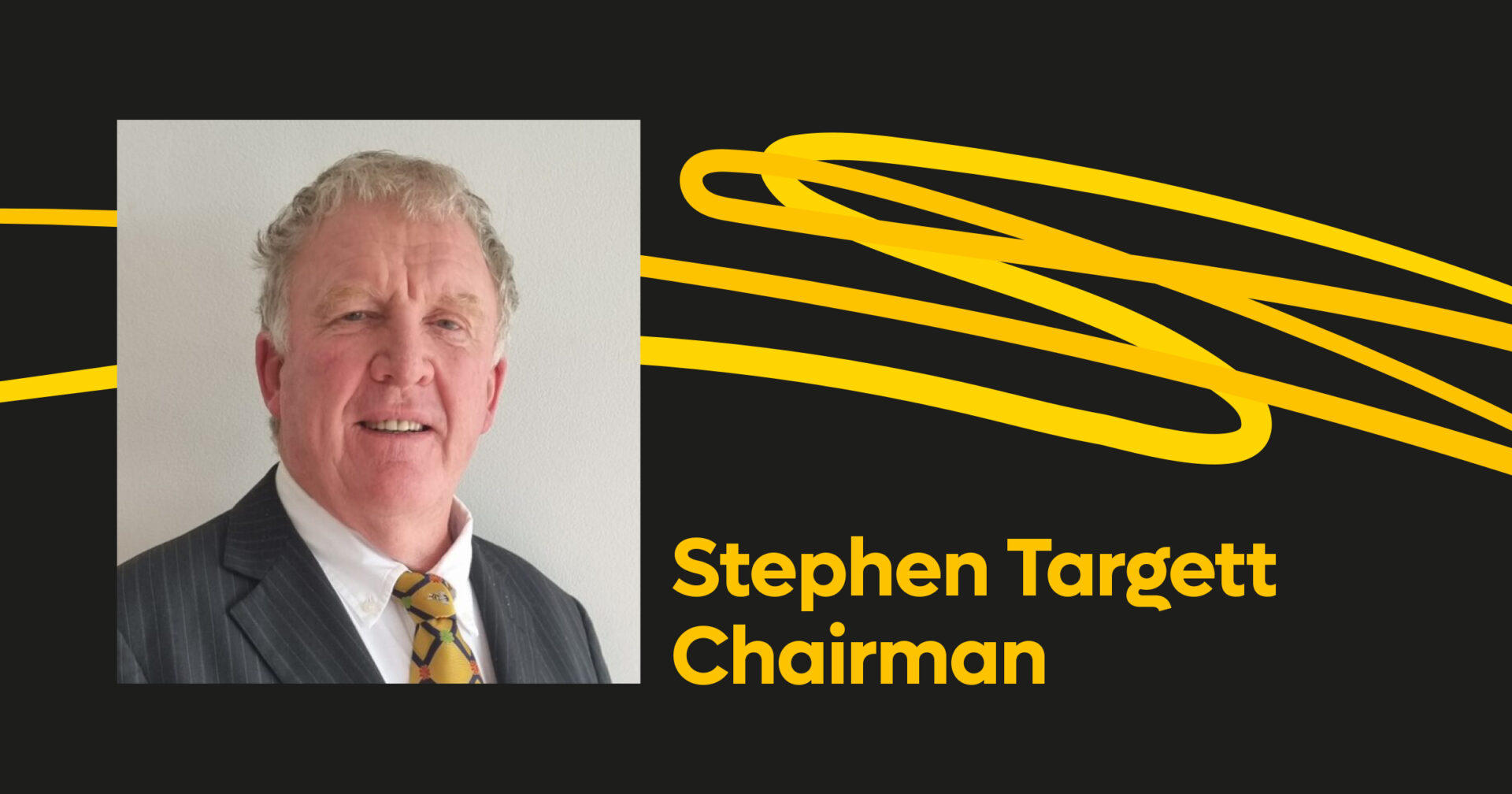
The AHBIC team recently met in Canberra for two days of workshops and meetings, unfortunately two of our executives were hunkered down due to Ex Tropical Cyclone Alfred but attended virtually. We had a very informative workshop on Tropilaelaps mites to deeper understand the pest and the threat but also to review our industry Contingency Plan and preparedness. The existing Tropi contingency plan was last reviewed way back in 2012. We debriefed on the Varroa incursion and will include the learnings into a new draft Tropilaelaps Contingency Plan that will be circulated for consultation when completed. There are still some knowledge gaps that need to be investigated before the draft Tropilaelaps plan can be completed. Disturbingly we learnt that Tropi mites can be more devastating than Varroa mites as they reproduce much quicker and are harder to control.
As a result of feedback from the 2024 AGM and future resource planning, we also held a workshop on AHBIC communications. We looked at what works well, what needs improving and what are some new opportunities to connect with beekeepers. An action from the workshop is for AHBIC to develop a communications plan-on-a-page which we will share when completed.
Varroa is now in Queensland with multiple detections near the Lockyer Valley. This is sad though unfortunately inevitable, as it spreads across the country over time. As Queensland comes to terms with the new detections, we constantly remind the Queensland government of AHBIC’s clear views on border restrictions. We have strong agreement across our member bodies and board that we advocate for regulated movements. This is to slow the spread but won’t prevent the spread. Movements allowed by risk mitigated regulation that finds the balance between business continuity and slowing the spread is imperative.
It disappoints me when I see comments on social media that AHBIC does nothing for the beekeeper. The AHBIC team work very hard to ensure government of all levels is aware of the importance of our amazing industry. We are working on having a level playing field with imported honey as well as input to potential new export markets for Australian honey. Working with Government departments is a slow process where change takes time to be implemented.
Some of the recent big ‘wins’ have included working with our plant industry colleagues to have the Federal Government Biosecurity Levy scrapped. Directly saving beekeepers a 10% increase in levies that gave no promise of additional industry benefit. AHBIC recently lobbied the government successfully to secure a grant to ensure the continuation of the National Bee Biosecurity Surveillance and Bee Biosecurity Programs. We have imported honey firmly in the sight of government with activities underway to level the playing field. We have had numerous ‘wins’ across the varroa response including ensuring the tangible outcomes are as beneficial as possible for industry. This includes practical extension and education workshops across all states and territories to ensure as many beekeepers as possible can access resources and develop skills for their future.
We are fast approaching the AGM and Conference period for our member bodies. AHBIC is aware that a lot of beekeepers are doing it tough, however supporting your state association is important to ensure the future of our fabulous industry.
Stephen Targett
Chair

The big dry continues across southern parts of Australia affecting honey production across SA and Vic. What looked like promising honey flows in Victoria have now been revised down due to the onset of cooler nights. Fires have also impacted many beekeeping sites across Vic and SA causing damage which will have flow on effects into next season. Conversely floods and endless rain in QLD and northern NSW has created its own set of issues for beekeepers in those areas.
At AHBIC we have continued to grind away on the industry issues and offer to support to our state member bodies where we can. Over the last month we have continued our work in the Varroa Transition to Management Program, met with DAFF in Canberra to discuss imported honey, liaised with the APVMA and varroa treatment manufacturers, and attended BerryQuest, National Pollination Strategy workshop and a Manuka Honey Association strategic planning day.
During the prolonged negotiations for the T2M program AHBIC was successful in arguing “exceptional circumstances” and had the program extended from 12 months to 24 months. However, this extension didn’t include an extension in budget.
As a result, we are seeing the first of some of the Varroa Development Officer (VDO’s) roles ending specifically in NSW first. However, due to T2M budget savings NSW has been able extend 3 VDO (down from 9) roles through to the end of December, just short of the T2M Program end. As part of transition away from the transition project NSW DPIRD have been able to secure NSW Treasury funding for additional 3 Bee Biosecurity Officers to help continue the beekeeper engagement within NSW. This is great for the NSW industry and hopefully other jurisdictions follow with similar investments.
A further 2 colonies and 1 abandoned nest have been found and destroyed, still within close proximity of the original detection. Re-testing of all Red Dwarf Honey Bee and European Honey samples for Deformed Wing Virus have returned negative results with further samples being collected. There are still 3 active sites where foraging Red Dwarf Honey Bee’s are being found. Further surveillance continues weather permitting.
The Imported Honey Subcommittee chair has been active in representing the subcommittee to government. Jon with an AHBIC delegation met with DAFF whilst in Canberra to discuss imported honey and the actions the department are taking. We are pleased that our of-the-shelf testing results are being used by the National Measurement Institute (government laboratory) to review current national testing protocols. We also discussed what is happening overseas and what further action the department will be taking to level the playing field. We are pleased with the progress but acknowledge until real on-ground outcomes are achieved the job is not done.
The levy review subcommittee has been meeting monthly working through the current levy, the forecasted budget and ideas to restructure the current levy to be more equitable across the industry. The subcommittee work has identified the need for reform without which will see finding for our program’s runout in the near future.
I attended Beery Quest in Hobart and spoke to the audience about Varroa and the biosecurity response. This was a great opportunity to connect with the berry industry understand their challenges and make sure honey bees was on their agenda. One of the big take–aways for me is that the berry industry is now the most valuable horticultural industry valued at $1.3 billion dollars GVP.
The month ahead has less meetings which will allow for the team to catch up on office jobs and make good progress on issues. We have a number of subcommittee meetings scheduled and a member bodies meeting and also an upcoming virtual meeting with National Residue Survey technical panel.
Hopefully Autumn brings some honey for those who need it most and some rain where it is needed.
Danny LeFeuvre
CEO
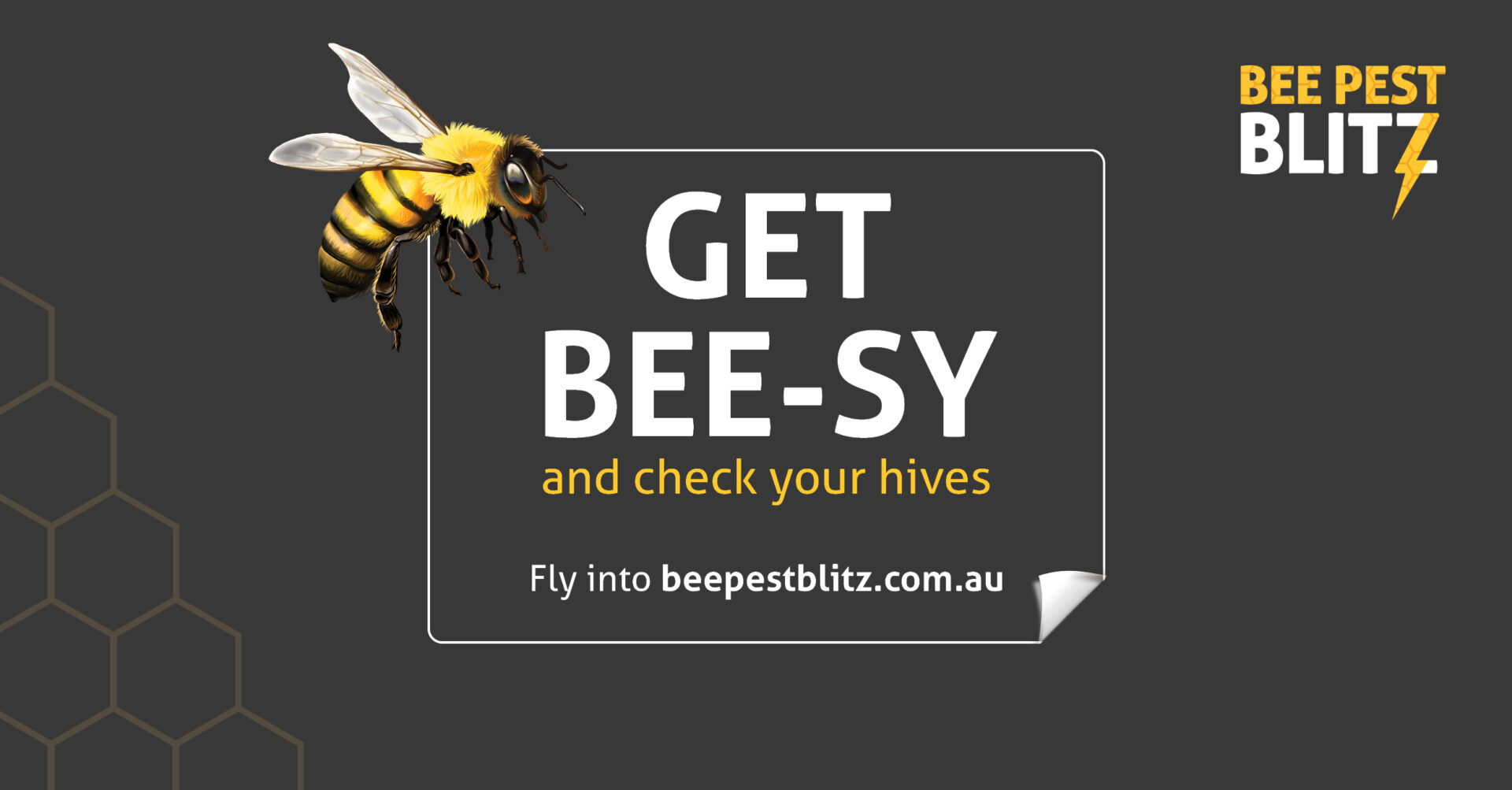

Bee Pest Blitz is a national initiative throughout April annually, it is a campaign to increase awareness of the importance of bee biosecurity and encourage beekeepers to inspect their hives for high priority exotic pests.
This national month-long call-to-action campaign encourages beekeepers to conduct surveillance during the month of April. But beekeepers can and should check their hives regularly.
The Bee Pest Blitz website beepestblitz.com.au is live and contains resources to assist beekeepers to conduct alcohol washes on their hives and report their findings.
Bee Pest Blitz is a Department of Agriculture, Fisheries and Forestry (DAFF) funded initiative, led by the Australian Honey Bee Industry Council (AHBIC), Plant Health Australia (PHA), and supported by all state and territory governments.
Bee Pest Blitz will be supported by Bee Biosecurity Officers (BBOs) in each state under the National Bee Biosecurity Program (NBBP), and engagement and networking with the National Bee Pest Surveillance Program (NBPSP).
By participating in the Bee Pest Blitz month, Australian beekeepers will fulfil their bee biosecurity obligations and one of the two inspection requirements under the Australian Honey Bee Industry Biosecurity Code of Practice.
Check out the new video explaining how to alcohol wash your hives! Dive into your hives this April and report your findings, all details on the website.

07 March 2025 – Industry Advice Notice (IAN 2025-07) from the Federal Department of Agriculture, Fisheries and Forestry.
IAN 2021-07 dated 25 March 2021 is being updated. The following information aims to provide clarification to industries and exporters about the evidence required to apply for manual export certification for non-prescribed goods (NPGs) under the Export Control Act 2020 (the Act).The aim of the DAFF IAN 2025-07 is to clarify that these evidence requirements also apply to certification for NPGs available in the Next Export Documentation (NEXDOC) system, and provides information on how to provide this evidence to the department.
In accordance with the Act, certification for NPG exports can occur to meet importing country requirements.
The department is responsible for Australia’s export regulatory system and maintaining international confidence in Australia’s agricultural and food exports.
Exporters are expected to make reasonable efforts to determine the requirements of the importing country, including whether certification is required.
If the importing country requires certification and requires the department to endorse that the goods being exported meet specific conditions, exporters are expected to provide evidence to the department that those conditions have been met.
If you are unable to source evidence that government-to-government certification is required, the department is able to issue an unendorsed certificate (for example, a certificate as to condition such as an EX188B/NX188B, or a M418/NX418 in the case of imported goods for re-export). Issuing of certification is contingent on all other application requirements being met.
Exporters are encouraged to conduct due diligence by confirming with the overseas authority any importing country requirements and if certification is required for your goods. You should do so well in advance of exporting and confirm you have access to all required documentation when applying for an export certificate.
To confirm that export consignments meet importing country requirements, and to provide correct export certification, the department requests exporters provide evidence of the importing country requirements when applying for a certificate. Evidence types are not fixed, but do need to be official. They may include:
a case from the department’s Manual of Importing Country Requirements (Micor)
official documentation from an importing country authority, and if certification is required, what information the certificate must attest to (for example, an import permit, copy of import protocol/regulation with translation)
a link to an overseas authority webpage where importing country requirements are outlined.
If applicable you may also need to provide evidence to demonstrate you meet the importing country requirements, for example:
If you are seeking a more complex certificate with additional endorsements, and you have been unable to obtain evidence of the importing country requirements, please contact Assessment Services Group – Exports at foodexports@aff.gov.au or the Non-prescribed Goods Export Program at NPGExports@aff.gov.au for further information. We ask that you do this well in advance of any planned shipments as determining importing country and certification requirements can take time.
If you are unable to source evidence that certification is required, but believe you still need a certificate, the department can issue an unendorsed certificate. An unendorsed certificate is one without additional attestations specific to the product beyond it being fit for human consumption (if applicable). Your application will need to include why you couldn’t obtain the importing country requirements and why you need a certificate, in addition to all other application requirements being met.
The department is transitioning NPG certification to the Next Export Documentation (NEXDOC) system. NEXDOC is already in place for export certification for honey, wool, skins, hides and feathers. Other Goods began transitioning to NEXDOC on 10 February 2025. See 2025-01: Transition to NEXDOC – Other Goods registration open.
Evidence requirements for manual certification and NEXDOC certification are the same.
For manual certification, evidence must be provided in email with your Application for a government export certificate for non-prescribed goods.
For NEXDOC certification, evidence must be submitted with your Request for Export (REX) via the NEXDOC portal.
Failure to provide appropriate evidence will result in requests for additional information that will delay the assessment of your application or REX.
If you have any questions regarding this IAN please email NPGExports@aff.gov.au
Joffrid Mackett
Assistant Secretary
Residues and Food Exports Branch
Exports and Veterinary Services Division
Department of Agriculture, Fisheries and Forestry
Call 1800 900 090
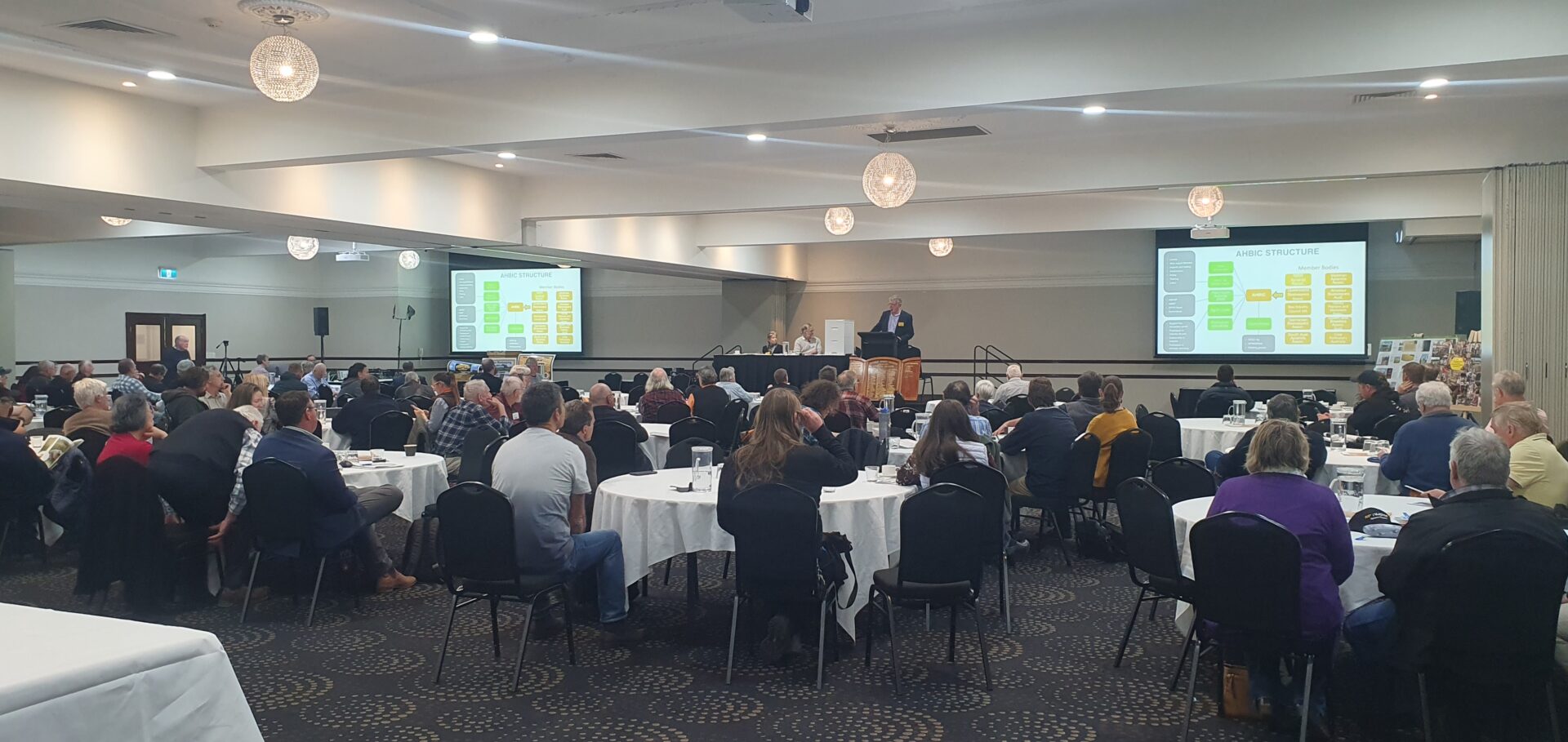
Set your calendars, find your state association and member body below, make sure to support your annual conference.
| Association | Date |
| New South Wales Apiarists Association | 22 & 23 May – Ballina, NSW |
| Tasmanian Beekeepers Association | 30 – 31 May – TBA, TAS |
| Crop Pollination Association of Australia Inc. | 10 June, Beechworth, VIC |
| Victorian Apiarists Association | 11 – 13 June – Beechworth, VIC |
| Queensland Beekeepers Association | 19 & 20 June – Southport, QLD |
| South Australian Apiarists Association | 4 July – Murray Bridge SA |
| Australian Honey Bee Industry Council – AGM | 5th July – Adelaide, SA |
| Bee Industry Council of WA | August 2025 |
| Amateur Beekeepers Australia | 30 August – Hornsby RSL, NSW |
| Honey Packers and Marketers Association | TBA |
| Australian Queen Bee Breeders Association | TBA |
The introduction to Australia of the exotic pest Varroa mite (Varroa destructor) will see the future of beekeeping change for all beekeepers. Whether you are a beekeeper of one hive or hundreds of hives the next few years will see the industry face new challenges as Varroa establishes across the state, and an increased workload for all.
The Transition to Management (T2M) project is working to increase the resilience and capacity of the industry to manage their hives with Varroa mites. For some beekeepers, this additional workload may mean beekeeping is no longer feasible for them and therefore decide to leave the industry.
The extra workload on managing hives with Varroa may not be the only reason beekeepers decide to exit the industry. Some alternative reasons for why you can no longer keep bees might be:
If you do decide beekeeping is no longer for you, you must ensure you find a new home for your bees. This might mean selling or giving the bees away before they deteriorate and create a nuisance.
In preparation for gifting or selling your hives there are a few things to consider.
1. Hive Health
Ensure your colony is healthy. Having a healthy hive is essential to beekeeping and will be what the new beekeeper expects. Be prepared that the new owner may want to conduct an inspection of your hive/s prior to purchase to visually confirm any information you are providing them about the state of health of the hive.
2. Hive Records
Where did you obtain your hives and how long have you had them? Ensure you can provide a history of the hive by completing a Vendors Declaration from AHBIC (https://honeybee.org.au/).
Are all your hive inspections and mite checks up to date as per the Biosecurity Code of Practice Inspecting Hives?
If you have over 50 hives, have you conducted an inspection and Honey Culture Test for American Foulbrood (AFB) in this apiary or any of your other apiaries?
Do you have records of your inspections and mite checks, including dates and results of such inspections? Victorian beekeepers may be able to provide such records from their BeeMAX online diary at https://bees.agriculture.vic.gov.au/.
3. Hive Components and Equipment
What to do with unwanted hive components or equipment? It may be that if you are selling hives the new owner will take/purchase any hive components and equipment also. You may have to sell or dispose of these separately though. Any components or equipment should be in good working order and free of degradation and pests or disease.
Where did you obtain your hives and how long have you had them? Ensure you can provide a history of the hive by completing a Vendors Declaration from AHBIC (https://honeybee.org.au/).
Are all your hive inspections and mite checks up to date as per the Biosecurity Code of Practice Inspecting Hives?
If you have over 50 hives, have you conducted an inspection and Honey Culture Test for American Foulbrood (AFB) in this apiary or any of your other apiaries?
Do you have records of your inspections and mite checks, including dates and results of such inspections? Victorian beekeepers may be able to provide such records from their BeeMAX online diary at https://bees.agriculture.vic.gov.au/.
In Victoria, beekeepers must notify the Bees Registrar in writing within 7 days when a hive is:
This is a requirement under the Livestock Disease Control Act 1994 and Livestock Disease Control Regulations 2017. Victorian beekeepers can do this through their BeeMAX online diary.
Victorian Beekeepers can find information and appropriate forms to use on the Selling or Giving away a beehive at agriculture.vic.gov.au.
Neglected hives can become diseased and a source of infection for other colonies nearby. Neglected hives can also have a negative impact on the industry if they swarm or become a public nuisance. Follow the Honey Bee Code of Practice protecting hives and do not allow your hives to become exposed or neglected.
If you sight any abandoned or neglected hives, please report these to your local Apiary Officer in your state.

In Victoria for further information or to report neglected hives contact Agriculture Victoria on 136 186 or email honeybee.biosecurity@agriculture.vic.gov.au.
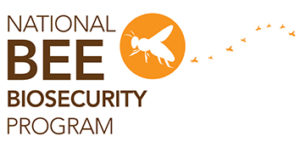
The National Bee Biosecurity Program is funded by the honey bee industry through a component of the agricultural honey levy, with state governments contributing in-kind resources. Plant Health Australia manages the program on behalf of the Australian Honey Bee Industry Council .
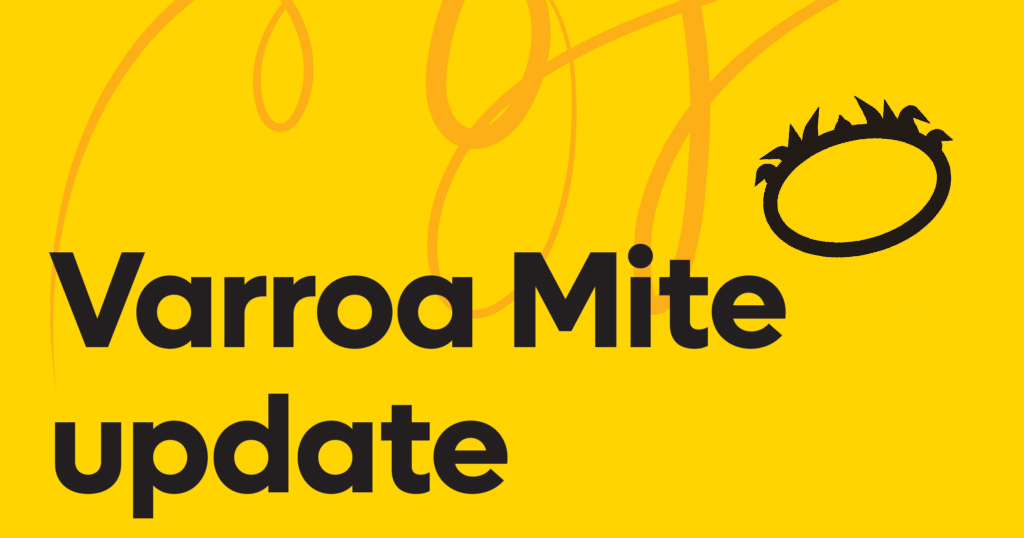
Varroa mite has been detected in a beekeeper’s hives on a property in the Kowen district of the ACT, very close to the border with NSW.
This is the first confirmation of Varroa mite detection in the ACT, although not a surprise, as there have been no movement restrictions between the state of NSW and the ACT since 20 December last year. Beekeepers within the ACT can view heat mapping for the ACT via the DPIRD NSW heat map.
To date, there has been no confirmed pathway of how varroa entered into Queensland when detected early March this year. Recent surveillance has confirmed further detections in and around the Lockyer Valley and Somerset Council areas, to a total of 20 infested premises.
Biosecurity Queensland’s varroa mite biosecurity zone remains in place. This prevents the movement of bees and live hives from jurisdictions with varroa mite (NSW, ACT & Victoria). These Queensland movement restrictions apply until 28 April 2025 unless removed or changed earlier.
AHBIC reminds beekeepers who have received bees, hives or equipment from the Lockyer Valley since December 2024 to conduct surveillance of their hives and report to the Bee123 portal, or if interstate check your relevant authority: Reporting Varroa.
Tracing of movements from the Locker Valley into South Australia have been cleared of any varroa presence by surveillance teams within Primary Industries and Regions South Australia (PIRSA).
The PIRSA – “South Australian Varroa Detection Response and Management Plan” is published online and outlines South Australia’s government response for detections, both outside and within SA and can be found at: South Australia Varroa Program – Detection Response and Transition to Management Plan.
Beekeepers must still apply for an entry permit from QLD into SA. We are told both DPI Queensland and PIRSA are reviewing the current process considering the recent QLD detections and the expansion of Varroa in Eastern States.
AHBIC successfully advocated for the national distribution of VDO across Australia within the T2M Program and we also fought hard to successfully extend the T2M from 12 to 24 months, including VDO roles.
Although VDOs are employed in government agencies they are funded under T2M via the Emergency Plant Pest Deed, our honey industry is responsible for a 1% share of the full varroa response, and this is funded by all levy paying beekeepers across Australia.
There are 34 VDO across Australia, overseen by AHBIC’s National Varroa Mite Coordinator, Bianca Giggins. The team of VDO are all passionate beekeepers, upskilled in varroa management, best practice beekeeping and ready to improve our industries capacity for the future.
Make sure if you haven’t engaged with the support VDO are offering that you reach out via:

VDO can help beekeepers with planning out how you will manage varroa in a case-by-case scenario treatment plan, tailored for your area, skillset and desired outcomes and are able to elaborate on the complex new skills and knowledge that will become part of your journey living with varroa in the future.
Beekeepers need to be aware that the T2M funding ceases in February 2026, including VDO funding, some of which will cease before February:
|
State/territory |
VDO End Date |
|
NSW & ACT |
Dec 2025 |
|
Victoria |
Dec 2025 |
|
Queensland |
Aug 2025 |
|
South Australia |
Feb 2026 |
| Tasmania |
Jan 2026 |
|
Western Australia |
Feb 2026 |
| Northern Territory |
Jan 2026 |
Table 1: showing cessation of VDO in states and territories across Australia
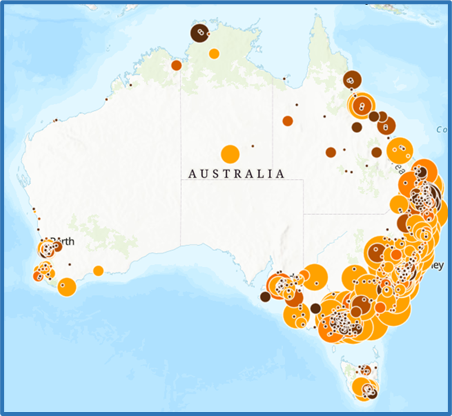
To view this Update in PDF Click Here
You can reach out to AHBIC via:
National Varroa Mite Coordinator
Bianca Giggins
0402 467 780
AHBIC, its employees, executive and consultants expressly disclaim all and any liability to any person in respect of anything, and the consequences of anything, done or omitted to be done in reliance, whether wholly, partly, upon the whole or any part of the contents of this industry update document.

As can be seen on the Queensland Varroa Heat map there are currently 11 infested premises in the Lockyer Valley and Somerset Regional Councils, as at 14th March. These are from both recreational and commercial apiaries, additional samples continue to be tested for Varroa mite and exotic viruses.
Over the coming months, it is expected additional detections across NSW & QLD border regions to also occur, due to natural spread but we remind beekeepers to conduct surveillance as finding varroa early is key to a successful integrated pest management approach to managing healthy honey bee colonies.
AHBIC reminds beekeepers who have received bees, hives or equipment from the Lockyer Valley since December 2024 to conduct surveillance of their hives and report to the Bee123 portal, or if interstate check your relevant authority: Reporting Varroa. Varroa mite remains either prohibited matter or reportable pest species across all states and territories.
Queensland
Queensland’s varroa mite biosecurity zone remains in place. This prevents the movement of bees and live hives from jurisdictions with varroa mite (NSW, Victoria). There is also a movement control order in place for the ACT due to unlimited movement between NSW and ACT. These Queensland movement restrictions apply until 28 April 2025 unless removed earlier.
South Australia
The PIRSA – “South Australian Varroa Detection Response and Management Plan” is published and outlines South Australia’s government response for detections, both outside and within SA and can be found at: South Australia Varroa Program – Detection Response and Transition to Management Plan.
Beekeepers must still apply for an entry permit from QLD into SA. We are told PIRSA is reviewing the current process in light of the recent QLD detection and the expansion of Varroa in Eastern States.
So far the Transition to Management has delivered 83 one day face-to-face workshops across the country with attendance by commercial beekeepers representing just 46% of the target set. In addition to the face-to-face workshop there are now options for online learning, a Varroa basics, and a 9 module online version of the content from the face-to-face workshops, which is estimated to take 3 hours to complete, beekeepers can find details through the BOLT training platform: Biosecurity Online Training – BOLT – PHA.
For details on upcoming face-to-face training near you, or to access the online resources visit Training — National Varroa Mite Management Program.
Sampling for the honeybee virus baseline survey has been steadily gaining momentum. Several collections have already been completed with both the help of VDO teams and some keen citizen scientists. Collection numbers differ in each state based on size of industry and so far the activity is 30% completed with a project report due August.
Varroa Development Officers continue to improve practical skills and knowledge of beekeepers across the country with group, one-on-one, association and branch engagements reaching record levels in February. Across the national team there have been over 700 engagements in February alone, reaching over 2,000 participating beekeepers. 169 of those beekeepers are commercially registered with a further 497 recreationally registered (some participants status are not listed as either, this could be a club or association branch).
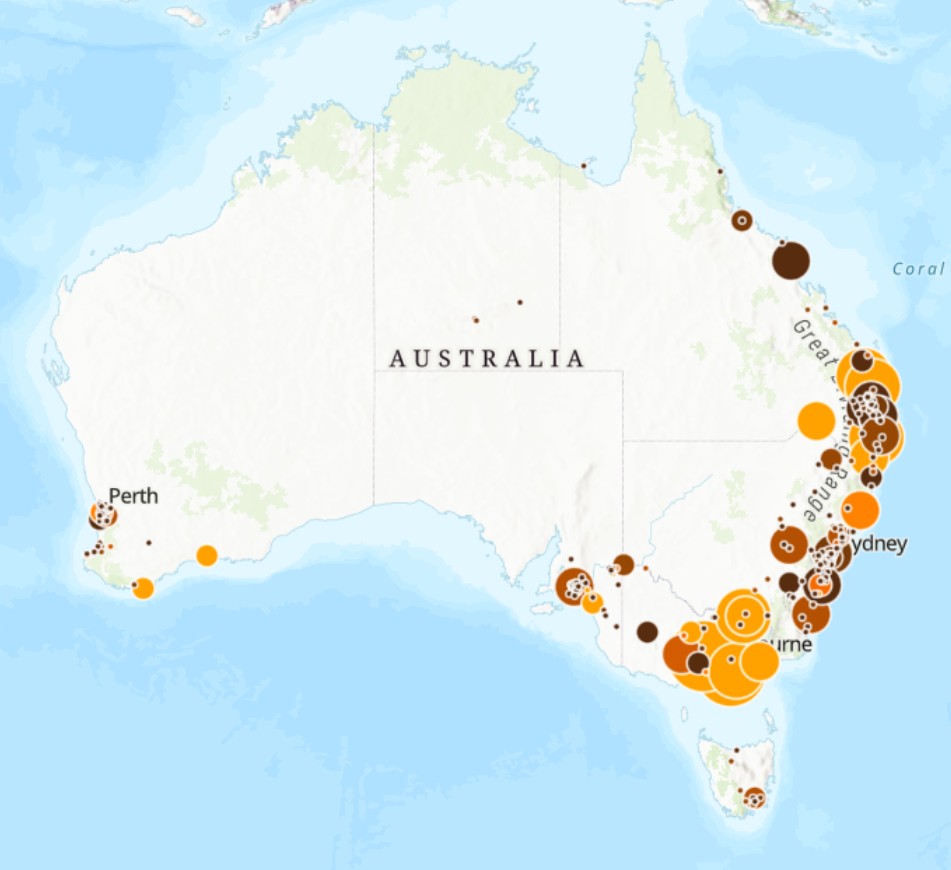
Some of the VDO work involves extension activities driven by demand and can be summarised by the following table for February:
| Engagement type | February amount nationally | Commercial | Recreational |
| Email and phone support | 99 | 25 | 74 |
| Presentations | 163 | 46 | 117 |
| In field / apiary | 446 | 98 | 348 |
The Varroa Development Officers are well informed, several across the country have international varroa management experience and have all been connected to uplift knowledge and skills of the team throughout their appointment so far. Reach out to a VDO in your area by visiting the website for information; https://www.varroa.org.au/vdo
Congratulations to the commitment of approximately 960 beekeepers who jumped in and completed Australia’s first ever Coloss Survey during February and March. Due to a busy season and a short timeframe to have the survey open, the overall goal of 500 commercial beekeepers completing the survey fell short. A steering committee meeting will soon review the progress with the Coloss team from ANU to ascertain potential improvements for future survey growth. AHBIC has had lots of feedback about beekeepers’ thoughts on the survey and encourage ongoing feedback to ensure the survey is well adopted and supported into the future, you can reach out to AHBIC anytime or email directly to the team via; coloss@anu.edu.au.
To view this Update in PDF Click Here
You can reach out to AHBIC via:
National Varroa Mite Coordinator
Bianca Giggins
0402 467 780
AHBIC, its employees, executive and consultants expressly disclaim all and any liability to any person in respect of anything, and the consequences of anything, done or omitted to be done in reliance, whether wholly, partly, upon the whole or any part of the contents of this industry update document.